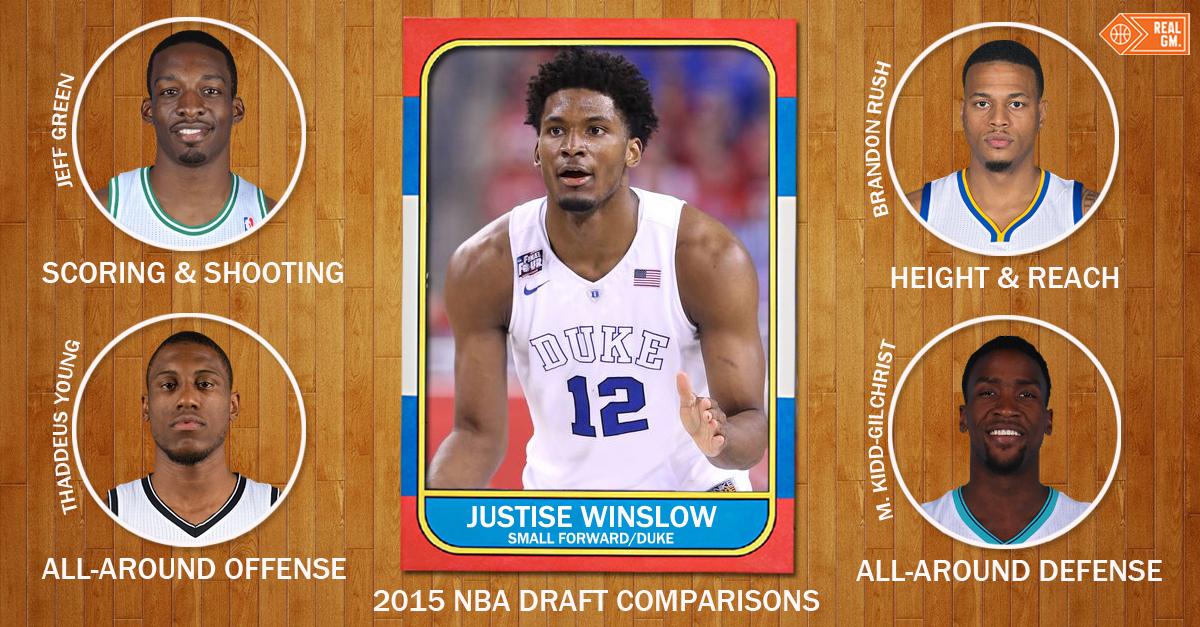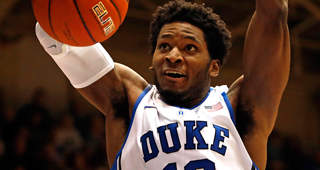Justise Winslow is the latest case study on how we rate intangibles and a “winning mentality.” That type of profile is often nebulous and extremely unreliable when predicting future NBA success. Tyus Jones won Most Outstanding Player of the NCAA Tournament, but just judging that list for "winners" has more Mateen Cleaves and Luke Hancocks than Anthony Davis and Shane Battiers.
Winslow played extraordinary basketball when Duke went small as a small-ball 4 next to Jahlil Okafor. Winslow is the type of player who is going to find a role on any team, but the team drafting him may get a deluxe role player instead of a true two-way star for their core.
In the NBA, Winslow will need to primarily play small forward and then be the small-ball 4 option in certain situations, so his shooting is the immediate concern. Jeff Green shot just 68.6 percent from the line as a freshman at Georgetown and 40.7 percent on three-pointers, which was an incredibly close comp to Winslow’s shooting numbers. Rudy Gay is another example of a really strong three-point percentage as a freshman that had his free throw shooting mark it as a red flag, shooting 46.7 percent and then it came down to 31.8 percent as a sophomore.
Winslow’s three-point attempts were often wide-open opportunities with opposing defenses collapsing against Okafor. With far from perfect mechanics and a slow release, Winslow’s percentages dropped substantially when guarded and the extra distance on the NBA line will likely be a difficult adjustment for him initially.
Winslow had an assist rate of 13.2 and usage of 22.9, which compares to Thaddeus Young’s freshman season on an altogether different Georgia Tech team. Winslow doesn’t have isolation type of scoring ability off the dribble in the halfcourt, but works well in a variety of roles within the flow of an offense as a slasher and on dribble penetration. Winslow frequently gets a matchup advantage on offense either against slower power forwards or slighter build wings he can bully with his strength.
Going north/south with that edge, Winslow can be deceptively quick in creating his own offense and does a great job remaining under control and in balance.
Winslow also can initiate the offense bringing the ball up quickly in transition off a defensive rebounding. Winslow’s decision-making and feel for the game can really be highlighted here as a passer.
The defensive metrics of Winslow are similar to Michael Kidd-Gilchrist and Kawhi Leonard, though not at the level of rebounding of the latter. These are quite clearly Winslow’s most favorable comparisons. Winslow has the same standing reach as Kidd-Gilchrist, but is a full inch shorter and is close in terms of height and reach to Brandon Rush and Shabazz Muhammad. Winslow elicits comparisons to fellow Blue Devils in Battier and Luol Deng, but he's significantly shorter than both, though the NBA is going shorter nowadays anyways.
Winslow’s commitment to defense is unwavering for a player with his talent and athleticism. Winslow can guard 2-4 on-ball at a high level and also remains focused as a help defender. Winslow has a great base of fundamentals to go with his highly praised toughness and work ethic.
Winslow will contribute immediately in the NBA on the defensive end of the floor, but there are some real concerns on how much of a positive he’ll ultimately be on the offensive end of the floor. If he’s unable to extend his range to the NBA three-point line, bigger defenders will be able to lay off him and he becomes a liability unless he’s the fourth or fifth option on offense, which is a low bar for a high lottery pick.
The ultimate hope in selecting Winslow is that you trust him to work hard and work intelligently on improving his shot to maximize his abilities on offense to become a high talent overachiever.




